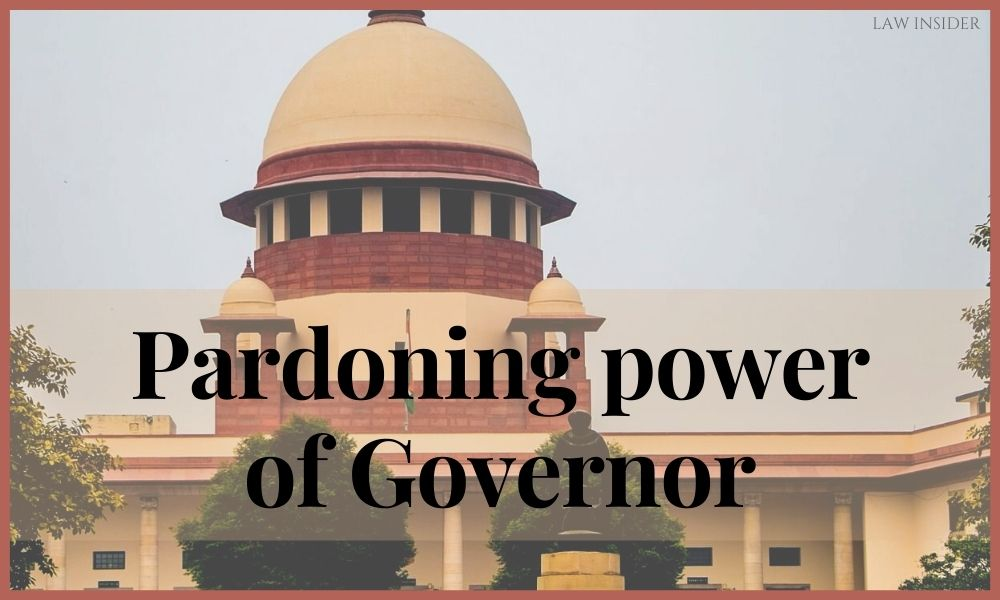Description

Copyright infringement not intended
Context - The Supreme Court of India denied the Union Government's claim that only the President has pardon power.
Details
- Earlier the union government has claimed that the President, and not the Tamil Nadu Governor, has “exclusive power” to decide on the plea for pardon by the Rajiv Gandhi assassination convict.
- The Government's stand was challenged in the Supreme Court.
- In the Supreme court, A three-judge Bench, led by Justice L. Nageswara Rao, said that the government's argument, if accepted, then it would leave Article 161 (the constitutional power of Governors of States to grant pardon) a “dead letter”.
- The bench stated that “if only President would have the exclusive power to grant pardons... So, over the period of 70-75 years, all pardons granted under Article 161 by Governors for the IPC are unconstitutional”.
Governor
- Part VI of the Indian Constitution deals with the State government.
- Articles 153 to 167 in Part VI of the Constitution deal with the state executive. The state executive consists of:
- The Governor
- The Chief Minister
- The Council of Ministers
- The Advocate General of State.
- The office of the governor has a dual role;
- The Governor is the chief executive head of the State.
- The Governor also acts as an agent of the central government.
- Normally, there is a governor for each state, but the 7th Constitutional Amendment Act of 1956 enabled the appointment of the same person as a Governor for 2 or more states.
- Governor is appointed by the president by warrant under his hand and seal.
- It is an independent constitutional office and is not under the control of or subordinate to the Central government.
Pardoning Power of the Governor
- Under Article 161 of the Indian Constitution, the Governor of a state can grant; Pardons, Reprives, Respites and Remissions of punishment or Suspend, Remit and Commute the sentence of any person convicted of any offence against any State law.
- Earlier, the Governor cannot pardon the death sentence that was the exclusive power of the Indian President. But in August 2021, the Supreme Court held that the Governor of a State can pardon prisoners; including death row ones, even before they have served a minimum of 14 years of a prison sentence.
- Pardon;
- It removes both the sentence and the conviction and completely forgives the convict from all sentences, punishments and disqualifications.
- Commutation;
- It denotes the substitution of one form of punishment for a lighter form.
- For example, a death sentence may be commuted to life imprisonment.
- Remission;
- It indicates reducing the period of a sentence without changing its character.
- For example, a sentence of imprisonment for two years may be remitted to imprisonment for one year.
- Respite;
- It suggests awarding a lesser sentence in place of originally awarded due to some special fact, such as the physical disability of a convict or the pregnancy of a woman offender.
- Reprieve;
- It means a stay of the execution of a sentence (especially that of death) for a temporary period.
- Its purpose is to enable the convict to have time to seek pardon or commutation from the Governor/President.
Comparison between Pardoning Powers of President and Governor
|
President
|
Governor
|
|
· Authority to pardon, reprieve, respite, remit, suspend, or commute the punishment or sentence of any person convicted of a violation of a Central law.
|
· Authority to pardon, reprieve, respite, remit, suspend, or commute the punishment or sentence of anyone who has been convicted of an offence against state law.
|
|
· Authority to pardon, reprieve, respite, remit, suspend, or commute a death sentence.
· The sole authority to pardon a death sentence.
|
· He is unable to pardon the death sentence. Even if a state law calls for the death penalty, the President, not the governor, has the authority to grant a pardon.
· However, the governor has the authority to suspend, remit, or commute a death sentence.
|
|
· Authority to grant pardon, reprieve, respite, suspension, remission, or commutation of punishment or sentence imposed by a court-martial (military court).
|
· He doesn't have this kind of power.
|
https://epaper.thehindu.com/Home/ShareArticle?OrgId=GE29Q82G2.1&imageview=0













